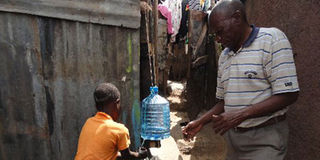Sh500m bid to end ‘flying toilets’ problem in Kibera

A health worker in Kibera shows a girl how to wash hands after visiting the toilet.
What you need to know:
- Water, Sanitation and Irrigation Chief Administrative Secretary Andrew Tuimur said the government is committed to improving water and sanitation in Kibera
The projects will also create jobs for more than 200 youths through the Mazingira Programme.
The national government has embarked on a Sh500 million project to improve water and sanitation in the informal settlement of Kibera in a bid to end the “flying toilets” menace.
“Flying toilets” is a euphemism for the unsanitary habit of defecating in plastic bags and flinging the waste onto rooftops, a practice that is common in Kibera. The Nairobi Regeneration Programme will execute the initiative.
Ablution blocks
The project will involve setting up water stations, ablution blocks, extending sewer lines and laying water pipes. Kibera has the dubious reputation of being the largest such settlement in Africa. It is synonymous with overcrowding and poor sanitation.
Water, Sanitation and Irrigation Chief Administrative Secretary Andrew Tuimur said the government is committed to improving water and sanitation in Kibera, “which is currently low at about 20 per cent” .
He said the Athi Water Works Development Agency (Awwda) has put up water stations in Kibera as well as 20 ablution blocks.
Awwda has also drilled and equipped six boreholes and built elevated steel tanks, water kiosks, and water distribution pipelines with a capacity to produce 2.5 million litres of water daily.
The water projects serve the areas of Kibera DC, Silanga, Kianda and Soweto.
Independent community water supply projects have also been contracted to provide safe and clean water for free to residents in a bid to curb Covid-19 spread.
Dr Tuimur said the government is looking for more funds to expand the projects in an effort to cover even more areas.
Open defecation
“The idea is to put an end open defecation and, if we get more funding, we will continue to build more ablution blocks and put up more sewer lines,” he said.
In May last year, the Nairobi Metropolitan Services (NMS) declared the informal settlement a special planning zone, suspending any further development in the area for two years.
NMS Director-General Mohamed Badi said this was to allow for the development of standards and guidelines for buildings and other forms of development in Kibera.
Dr Tuimur also said the government has set aside Sh500 million for projects that will benefit more than 40,000 residents.
Repairing manholes
The projects will also create jobs for more than 200 youths through the Mazingira Programme.
They include Ngong River clean-up and the Kibera Water and Sanitation Project, which entails unblocking, de-silting, and repairing manholes — an extension of a sewer line to the Jamhuri Showground — and laying water supply lines.





